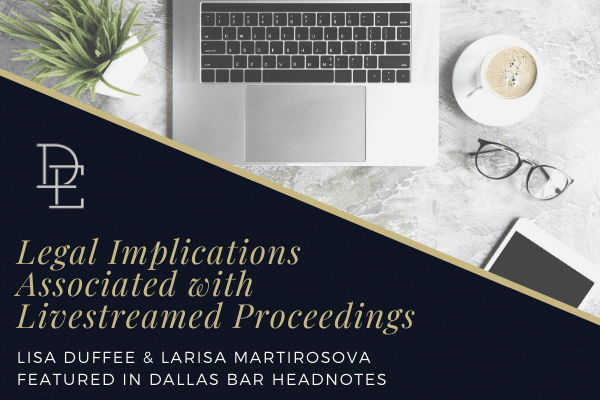Legal Implications Associated with Livestreamed Proceedings
After the COVID-19 pandemic reached Texas, courts were among the first agencies to limit public interaction by postponing non-critical hearings and handling critical matters remotely. More recently, courts expanded beyond just hearing “essential” matters, with many courts now handling a variety of proceedings remotely, including final trials.
Proceedings are now being held on the videoconferencing application Zoom and then streamed to the public on YouTube to maintain the transparency and allow access to the remote court proceedings. The individual courts’ web pages now have a tab called “Join Livestream” which links to live YouTube feeds of the growing number of Zoom proceedings. Many courts’ online COVID-19 policies and procedures warn litigants that, due to Texas law’s “Open Courts Provision,” anyone may gain access to view the proceeding. However, any video or audio recording of the livestreams is prohibited.
The right of the public to attend civil trials is grounded in the First Amendment as well as the common law. However, although constitutional in nature and origin, the right to public and open hearings is not without limitations, and may be outweighed by other competing rights or interests, such as interests in security, preventing disclosure of non-public information, ensuring a fair trial, or protecting a child from emotional harm.
So what safeguards are available to litigants who may be concerned and wish to limit public access to their remote proceedings?
Under both the United States and Texas Constitutions, an individual has a privacy interest in avoiding the disclosure of certain personal matters. For family courts in particular, marital relationships, procreation, contraception, family relationships, child rearing, education, and medical records fall within the constitutionally protected zone of privacy. If children are involved, broadcasting the child’s private, confidential, and privileged information on YouTube is not in their best interest and should be protected. The Texas Family Code expressly permits the limiting of public access by agreement in contested hearings involving Suits Affecting Parent Child Relationship (SAPCR) claims and rights. If supported by appropriate findings made on the record, the court may limit attendance at the hearing to only those persons who have a direct interest in the suit or in the work of the court.
Another safeguard is grounded in Rule 18c of the Texas Rules of Civil Procedure.
Rule 18c allows a trial court to broadcast, televise, record, or photo- graph the proceedings in the courtroom only in the following circumstances: (a) in accordance with guidelines promulgated by the Supreme Court for civil cases, or (b) when the broadcasting, televising, recording, or photographing will not unduly distract participants or impair the dignity of the proceedings and the parties have consented, and consent to being depicted or recorded is obtained from each witness whose testimony will be broadcast, televised, or photographed, or (c) the broadcasting, televising, recording, or photo- graphing of investiture or ceremonial proceedings. Tex. R. Civ. P. 18c. The Texas Supreme Court has not promulgated statewide guidelines under Rule 18c(a). Instead, the Supreme Court allows Texas district courts, county courts, county courts at law, and pro- bate courts to propose local rules set- ting forth guidelines for recording and broadcasting court proceedings. Only a handful of Texas courts have done that. In the absence of Texas Supreme Court guidelines, Rule 18c(b) contemplates that no broadcasting will be permitted without the consent of all parties and witnesses.
Health Insurance Portability and Accountability Act (HIPAA) provides significant safeguards against disclosing health information at a proceeding that will be made public via YouTube. When disclosure of health information is authorized under narrow exceptions, a covered entity must make reasonable efforts to limit protected health information to the minimum necessary to accomplish the intended purpose of the use, disclosure, or request. Allowing worldwide disclosure of the party’s information via YouTube arguably renders HIPAA meaningless.
If a case involves businesses or companies, concerns associated with dis- closure of business dealings or trade secrets may come into play. The Texas Uniform Trade Secret Act (“TUTSA”) provides that a court shall preserve the secrecy of an alleged trade secret by reasonable means. If a company’s financial information, business plans, customer lists, and other proprietary and sensitive information can be broadcasted to the world via YouTube, and falls into the hands of a competitor, for example, the company and its employees may suffer considerable harm.
For the duration of this pandemic and while the emergency orders are in effect, courts must find a practical and effective way to enable public access to remote court proceedings while balancing privacy and other competing interests.
Questions?
Get in touch
4311 Oak Lawn Ave
Dallas TX 75219
E: info@d-elaw.com
P: 214 416 9010
